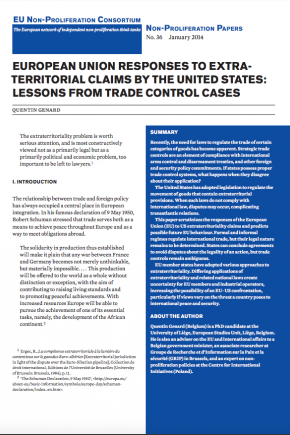European Union Responses to Extraterritorial Claims by the United States: Lessons from Trade Control Cases
Recently, the need for laws to regulate the trade of certain categories of goods has become apparent. Strategic trade controls are an element of compliance with international arms control and disarmament treaties, and other foreign and security policy commitments. If states possess proper trade control systems, what happens when they disagree about their application? The United States has adopted legislation to regulate the movement of goods that contain extraterritorial provisions. When such laws do not comply with international law, disputes may occur, complicating transatlantic relations. This paper scrutinizes the responses of the European Union (EU) to US extraterritoriality claims and predicts possible future EU behaviour. Formal and informal regimes regulate international trade, but their legal nature remains to be determined. States can conclude agreements to avoid disputes about the legality of an action, but trade controls remain ambiguous. EU member states have adopted various approaches to extraterritoriality. Differing applications of extraterritoriality and related national laws create uncertainty for EU members and industrial operators, increasing the possibility of an EU–US confrontation, particularly if views vary on the threat a country poses to international peace and security.

